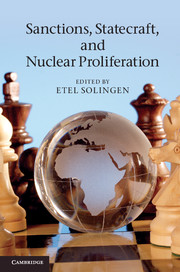Book contents
- Frontmatter
- Contents
- Figures
- Tables
- Contributors
- Preface and acknowledgments
- Part I Anatomy of inducements
- Part II Competing perspectives
- 4 Positive incentives, positive results?
- 5 An analytically eclectic approach to sanctions and nonproliferation
- 6 Threats for peace?
- Part III Reassessing the record: focused perspectives
- Part IV Conclusions: understanding causal mechanisms and policy implications
- References
- Index
4 - Positive incentives, positive results?
Rethinking US counterproliferation policy
Published online by Cambridge University Press: 05 June 2012
- Frontmatter
- Contents
- Figures
- Tables
- Contributors
- Preface and acknowledgments
- Part I Anatomy of inducements
- Part II Competing perspectives
- 4 Positive incentives, positive results?
- 5 An analytically eclectic approach to sanctions and nonproliferation
- 6 Threats for peace?
- Part III Reassessing the record: focused perspectives
- Part IV Conclusions: understanding causal mechanisms and policy implications
- References
- Index
Summary
Although few issues weigh more heavily on the international community’s concerns than the specter of nuclear weapons acquisition by regimes that flout core norms of international behavior, we do not sufficiently grasp how this can happen and what other nations could do about it. My aim, here, is to illuminate the intersection between this volume’s concern with the domestic, political, and economic sources of nuclear weapons programs and my own developing interest in the use of positive incentives as tools with which to elicit cooperation from established adversaries.
Most research on nuclear proliferation inquires how a nuclear weapons capability can be acquired and why it might be sought in the first place. The latter question often involves examining the security needs nuclear weapons could serve and their expected impact on the country’s international standing. Nevertheless, the value of a focus on the international ends of nuclear weapons is limited. Because neither security interests nor concerns with national status are invariant across regimes, both can be adequately understood only when viewed in the context of the target country’s domestic, as well as international, conditions. In this regard, one line of research has sought to root quests for nuclear weapons in social-psychological forces, as in a vision of national identity, or in the social norms that shape nuclear ambitions. Yet norms are not formed in a political vacuum, whereas conceptions of national identity often flow from the legitimizing needs of political elites. Even apparent security imperatives are rarely as objective as their proponents profess. The virtue of this volume is that it seeks the sources of nuclear behavior in the circumstances within which all other relevant forces acquire their meaning, thus offering particularly credible insights into the levers by which security threats can best be controlled.
- Type
- Chapter
- Information
- Sanctions, Statecraft, and Nuclear Proliferation , pp. 125 - 153Publisher: Cambridge University PressPrint publication year: 2012
- 2
- Cited by



